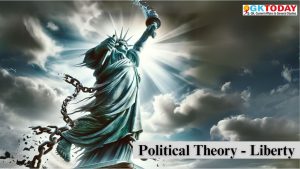UGC-NTA NET Political Science – Political Theory – Liberty

Liberty is the state of being free within society. It encompasses freedom from oppressive restrictions imposed by authority. This includes one’s way of life, behaviour, and political views. There are two main types of liberty –
- Negative Liberty: This refers to freedom from interference by others. It is closely associated with classical liberalism.
- Positive Liberty: This is the ability to act upon one’s free will. It is linked to social and economic conditions.
Types of Liberty
Liberty can be categorised into several types:
- Civil Liberty: Rights and freedoms that protect individuals from government overreach, such as freedom of speech and religion.
- Political Liberty: The right to participate in political processes, including voting and running for office.
- Social Liberty: The freedom to engage in social activities without oppression.
Historical Perspectives
Key thinkers have shaped the understanding of liberty throughout history:
- John Locke: He emphasised natural rights and the protection of individual liberty as a fundamental purpose of government.
- Isaiah Berlin: He introduced the distinction between negative and positive liberty in his essay “Two Concepts of Liberty.”
- John Stuart Mill: Advocated for individual liberty and introduced the harm principle. This principle states that individuals should be free to act as they wish unless their actions harm others.
Philosophical Foundations
The philosophical underpinnings of liberty include:
- Social Contract Theory: This theory posits that individuals consent to form a government that will protect their liberties.
- Utilitarianism: This belief holds that liberty should be maximised to promote overall happiness.
- Libertarianism: A political philosophy that emphasises individual liberty as the highest political value.
Legal Framework
Liberty is often enshrined in legal documents:
- Constitutional Provisions: Many constitutions include provisions for protecting liberties, such as the Bill of Rights in the U.S. Constitution.
- International Human Rights Instruments: Documents like the Universal Declaration of Human Rights (UDHR) affirm the importance of liberty globally.
Challenges to Liberty
Numerous challenges threaten liberty :
- Authoritarianism: Governments that restrict individual freedoms for control pose threat.
- Surveillance and Privacy: Advances in technology can infringe upon personal liberties.
- Social Inequality: Economic disparities can limit access to liberty for certain groups in society.
Contemporary Debates
Current discussions surrounding liberty include:
- Freedom of Speech vs. Hate Speech: There is an ongoing debate about balancing individual liberties with potential societal harm.
- Liberty vs. Security: The tension between personal freedoms and national security measures is a critical issue.
- Digital Liberty: Issues surrounding internet freedom, data privacy, and censorship are increasingly relevant.
Key Thinkers and Texts
Several key thinkers have contributed to the discourse on liberty:
- John Locke: His work “Two Treatises of Government” lays the groundwork for understanding liberty.
- John Stuart Mill: His book “On Liberty” is a seminal text in the study of individual freedom.
- Isaiah Berlin: “Four Essays on Liberty” explores the complexities of liberty.
- Robert Nozick: In “Anarchy, State, and Utopia,” he presents a libertarian perspective on the role of the state.
Importance of Liberty
Liberty holds immense significance in society:
- It is fundamental to democratic governance and individual autonomy.
- Liberty is essential for the protection of human rights and social justice.
- It promotes diversity and pluralism, allowing various viewpoints to coexist.
Related Concepts
Liberty is interconnected with several other concepts in political theory:
- Equality: The relationship between liberty and equality is a vital area of study.
- Justice: Liberty interacts with concepts of fairness and justice, raising important questions.
- Democracy: The role of liberty in democratic systems and processes is crucial for ensuring representation.


